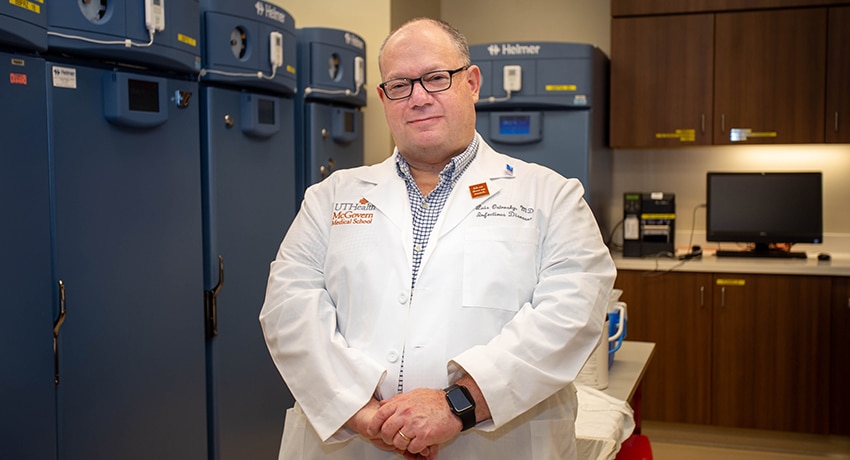Two clinical trials that will evaluate drugs, biologics, medical devices, and other therapies for long COVID that are sponsored by the National Institutes of Health (NIH) will launch at UTHealth Houston.
The trials are part of the NIH Researching COVID to Enhance Recovery Initiative (RECOVER), a large, nationwide research program designed to understand, treat, and prevent long COVID, which is marked by long-term symptoms following infection by SARS-CoV-2, the virus that causes COVID-19.
The UTHealth Houston site will be led by Luis Ostrosky, MD, professor of medicine and epidemiology, division director of infection diseases, and Memorial Hermann Chair at McGovern Medical School at UTHealth Houston.
“Long-term effects of COVID are different for everyone and they can affect many different parts of the body, such as the brain, heart, and lung,” said Ostrosky, chief of infectious diseases for UTHealth Houston and staff physician at the COVID-19 Center of Excellence. “People who have long COVID can have different kinds of symptoms that can last weeks, months, or years.”
The initiative is designed as a platform protocol to evaluate multiple treatments simultaneously to identify more swiftly those that are effective. RECOVER is looking to enroll 900 adult participants for each study intervention across the 200 participating institutions. UTHealth Houston will enroll at least 40 participants per study beginning in mid-August.
“RECOVER-VITAL will test different therapeutic agents for long COVID in general,” Ostrosky said. “RECOVER-NEURO will test different strategies to rehabilitate people with cognitive dysfunction after COVID, such as brain fog, memory problems, as well as difficulty with attention, thinking clearly, and problem-solving.”
The initial stage of the initiative involved launching large observational multisite studies examining and following people through their experience with COVID-19 to learn why some people develop long-term symptoms while others recover completely. These ongoing studies have recruited more than 24,000 participants to date. Researchers also are analyzing 60 million electronic health records and conducting more than 40 pathobiology studies on how COVID-19 affects different body tissues and organs.
“We know that when patients are suffering, we can never move fast enough,” said Acting NIH Director Lawrence A. Tabak, DDS, PhD. “NIH is committed to a highly coordinated and scientifically rigorous approach to find treatments that will provide relief for the millions of people living with long COVID.”
For more information on the trial, visit https://recovercovid.org/. If you are interested in enrolling in one of the trials at UTHealth Houston, contact Virginia Umana at 713-500-8905.
Media Inquiries: 713-500-3030


